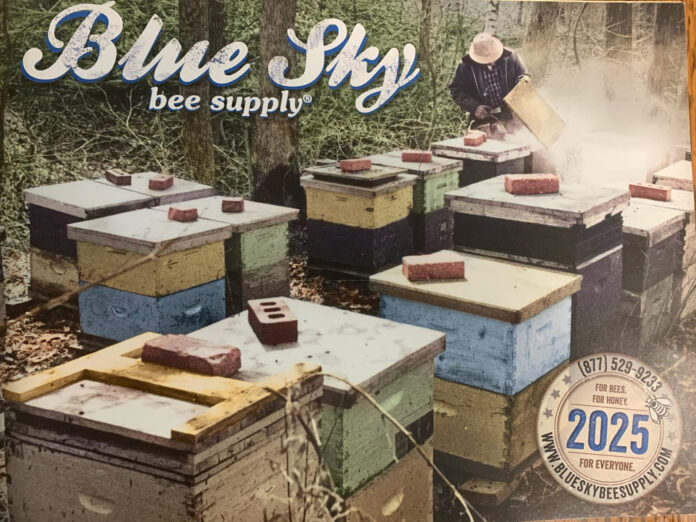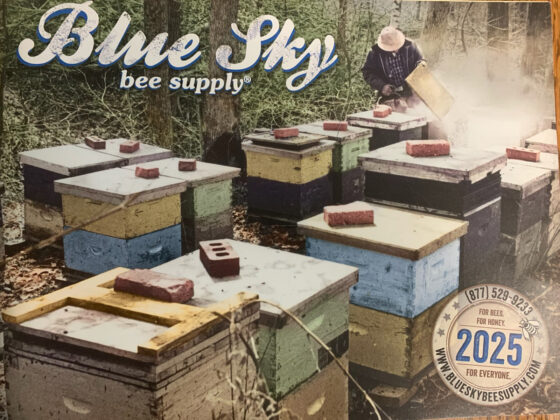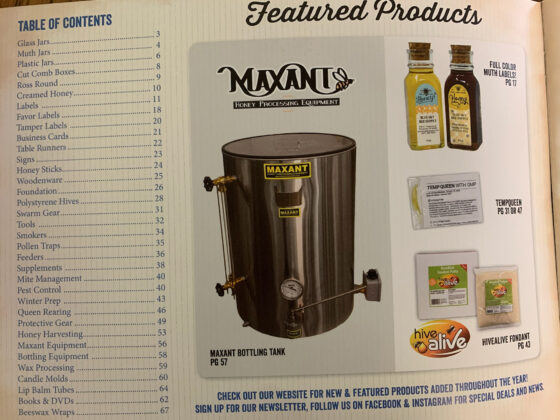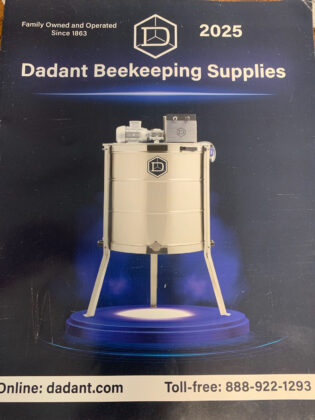It’s easy for the beginning beekeeper to be confused or overwhelmed when starting because of the many types of equipment offered. Should I buy an 8-frame or a 10-frame hive? How many deep hives do I need? Do I need an inner cover? Should I buy a full suit or a jacket? Do I need neoprene or leather gloves? Big smoker or small smoker?
Getting started
The short answer is it depends. Everything depends on your personal preference, and whether you’re going for two hives or eventually 20 or even 100 hives.
The big catalogs that you can get for free from Mann Lake Company or Dadants Company sometimes only add to the confusion when you see the multiple offerings. The catalogs are great and offered for free or online for the beginner to familiarize themselves and understand the terminology and use of each piece of equipment.
Blue Sky Bee Supply is another bee supplier in northeast Ohio that is located in Ravenna. They offer a free catalog at www.blueskysupply.com. They specialize in glass and plastic jars for selling your honey, as well as labels you can customize for your own needs. This family-owned company is friendly, fair and easy to deal with.
Personal protective equipment
The basic pieces of personal protection to manage your beehive are going to be either a veil, suit or jacket. The full bee suit can cost from $80 to $150, and it depends on quality and whether it is ventilated.
The more expensive ventilated suit usually has pant leg zippers that allow you to take the suit on and off without removing your shoes. The ventilated suit will also keep you cooler if you’re going to be out in the hot sun for hours at a time, and in my opinion, it is worth the extra money if you have a lot of hives to work.
The second choice is the ventilated jacket, which can cost up to $130. The non-ventilated jacket will cost half as much. Most beekeepers prefer the ventilated jacket primarily for easy maneuverability, as well as good protection. Bees rarely sting you through your jeans, so you don’t necessarily need a full suit. Having said that, if you wear the cheaper women’s type jeans or your jeans are wet from being caught out in the rain, they can sting you.
The last item is a veil or head net. This is used for sometimes quick inspections or when you know your bees are not aggressive. The veil can be as cheap as $15 and can be used with a baggy jacket as a full suit if you want to go on the cheaper route. If stopping for a quick view or to feed your bees quickly, put on the veil or head net. The YouTubers you see without a veil are playing with fire, for it takes only one perfectly placed stinger by your eye to ruin your Memorial Day weekend. A swollen eyelid is painful and restricts your driving capabilities, so always wear your veil in your bee yard. One sting to the face will change your way of thinking. But why risk it? They’re not your friends, they’re your bees.
New beekeepers should invest in a good pair of leather gloves. Gloves will cost about $15. These soft goatskin or calfskin gloves will extend up to the forearm and protect your wrist from stings.
As you get more comfortable with your bees, you can transition to the 7 mill harbor freight rubber gloves for about $9.99 per pack of 50. They also offer 5 mil gloves at the same price but have 100 in the box. In my opinion, the 5 mil gloves are too lightweight to use and will tear and rip easily, unless you need them for short, quick jobs. What’s the advantage of using these gloves? They’re disposable, and when you work in multiple hives and multiple yards, you won’t spread cooties between your yards.
The smoker may be one of the most important personal protection tools. They come in different sizes, ranging from $20 to $70. Some smokers have leather bellows or are equipped with plastic bellows. The bellows comprise the accordion part that you compress to send air into the stainless steel firebox to create the smoke that is then forced out of the nozzle to smoke the bees. The smoke that calms the bees can be arguably the most important protection device.
Usually, the cheaper smoker will fail at the place where the bellows material is riveted to the sides. Sometimes good T Rex tape will fix this, but once you get a hole in the bellows, the air will not function properly and will reduce the outflow. Then it’s harder to keep it blowing and the woodchips lit. Having said that, a smoker for the beginner will last seasons if put away and not thrown in the back of the truck bed or mishandled. I would opt for the cheaper smoker for the beginner.
Don’t buy smoker fuel from the catalogs. Smoker fuel is all around, and you can find dry wood or chips, or if you are out in the field, burlap bags or pine shavings or even old t-shirts will work. A bag of TSC pine or cedar shavings for $10 is great and will last you throughout the season. Wood smoker pellets can also be added to burn longer and hotter in your smoker.
Free classes
Beekeeping is no fun when you’re not properly protected, and you will soon lose interest in this fascinating hobby if you’re afraid of going out and getting into your hives. I will be having multiple field days coming soon at the SAM Center located at 8101 Manchester Ave., Canal Fulton, Ohio, where we will have 10 to 20 hives for new beekeepers to check out and get hands-on instruction. Classes are FREE and tentatively will start in June. Email me at scottsvab@icloud.com for more information if you’re interested.

















It’s https://www.blueskybeesupply.com/